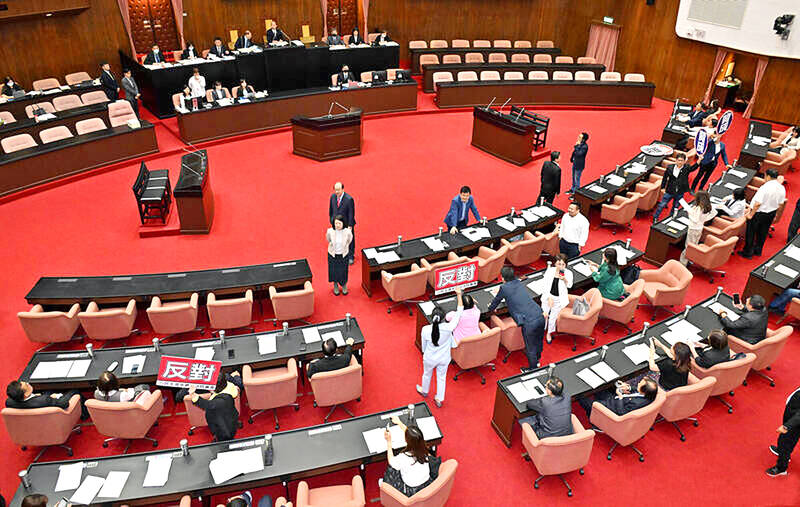The Chinese Nationalist Party (KMT) yesterday proposed inviting president-elect William Lai (賴清德) to make a historic first state of the nation address at the legislature following his inauguration on May 20.
Lai is expected to face many domestic and international challenges, and should clarify his intended policies with the public’s representatives, KMT caucus secretary-general Hung Meng-kai (洪孟楷) said when making the proposal at a meeting of the legislature’s Procedure Committee.
The committee voted to add the item to the agenda for Friday, along with another similar proposal put forward by the Taiwan People’s Party (TPP).

Photo: Tien Yu-hua, Taipei Times
The invitation is in line with Article 15-2 of the Act on Exercising Legislative Yuan Powers (立法院職權行使法), Hung said, urging the Democratic Progressive Party (DPP) caucus not to block the measure.
Legislative Speaker Han Kuo-yu (韓國瑜) is to chair cross-caucus negotiations and everything would be on the table, he added.
The TPP yesterday said that the legislature should hear a state of the nation address.
The legislature can invite the president to deliver such an address at the opening session every year, it said, adding that Lai should, by law, be required to answer legislators’ questions.
DPP caucus convener Rosalia Wu (吳思瑤) said that Lai was amenable to making such an appearance and that the party was willing to discuss the issue during cross-caucus negotiations as long as the demands are legal.
The parties were unclear on whether Lai would leave after giving the address, or whether he should respond individually to each question or address all questions simultaneously, Wu said, suggesting that the party caucuses address the issue by clarifying Article 15-4 of the Legislative Yuan Powers Act.
The article states that party caucuses should discuss during cross-caucus negotiations the total time for questions, the number of people, the order in which they ask their questions and the number of questions allotted to parties based on legislative seats, should legislators still have questions after the president’s address.
Separately, DPP Legislator Puma Shen’s (沈伯洋) proposal to restrict elected representatives from visiting China was again blocked from being put on the discussion roster by the Procedure Committee.
The KMT also proposed removing the restrictions on people wishing to visit China, prioritize measures to allow Chinese tourists to visit the offshore counties of Kinmen, Penghu and Lienchiang, and increase prices for public food procurement from NT$26 per kilogram to NT$34 per kilogram.
Additional reporting by CNA

STILL COMMITTED: The US opposes any forced change to the ‘status quo’ in the Strait, but also does not seek conflict, US Secretary of State Marco Rubio said US President Donald Trump’s administration released US$5.3 billion in previously frozen foreign aid, including US$870 million in security exemptions for programs in Taiwan, a list of exemptions reviewed by Reuters showed. Trump ordered a 90-day pause on foreign aid shortly after taking office on Jan. 20, halting funding for everything from programs that fight starvation and deadly diseases to providing shelters for millions of displaced people across the globe. US Secretary of State Marco Rubio, who has said that all foreign assistance must align with Trump’s “America First” priorities, issued waivers late last month on military aid to Israel and Egypt, the

‘UNITED FRONT’ FRONTS: Barring contact with Huaqiao and Jinan universities is needed to stop China targeting Taiwanese students, the education minister said Taiwan has blacklisted two Chinese universities from conducting academic exchange programs in the nation after reports that the institutes are arms of Beijing’s United Front Work Department, Minister of Education Cheng Ying-yao (鄭英耀) said in an exclusive interview with the Chinese-language Liberty Times (the Taipei Times’ sister paper) published yesterday. China’s Huaqiao University in Xiamen and Quanzhou, as well as Jinan University in Guangzhou, which have 600 and 1,500 Taiwanese on their rolls respectively, are under direct control of the Chinese government’s political warfare branch, Cheng said, citing reports by national security officials. A comprehensive ban on Taiwanese institutions collaborating or

France’s nuclear-powered aircraft carrier and accompanying warships were in the Philippines yesterday after holding combat drills with Philippine forces in the disputed South China Sea in a show of firepower that would likely antagonize China. The Charles de Gaulle on Friday docked at Subic Bay, a former US naval base northwest of Manila, for a break after more than two months of deployment in the Indo-Pacific region. The French carrier engaged with security allies for contingency readiness and to promote regional security, including with Philippine forces, navy ships and fighter jets. They held anti-submarine warfare drills and aerial combat training on Friday in

COMBAT READINESS: The military is reviewing weaponry, personnel resources, and mobilization and recovery forces to adjust defense strategies, the defense minister said The military has released a photograph of Minister of National Defense Wellington Koo (顧立雄) appearing to sit beside a US general during the annual Han Kuang military exercises on Friday last week in a historic first. In the photo, Koo, who was presiding over the drills with high-level officers, appears to be sitting next to US Marine Corps Major General Jay Bargeron, the director of strategic planning and policy of the US Indo-Pacific Command, although only Bargeron’s name tag is visible in the seat as “J5 Maj General.” It is the first time the military has released a photo of an active